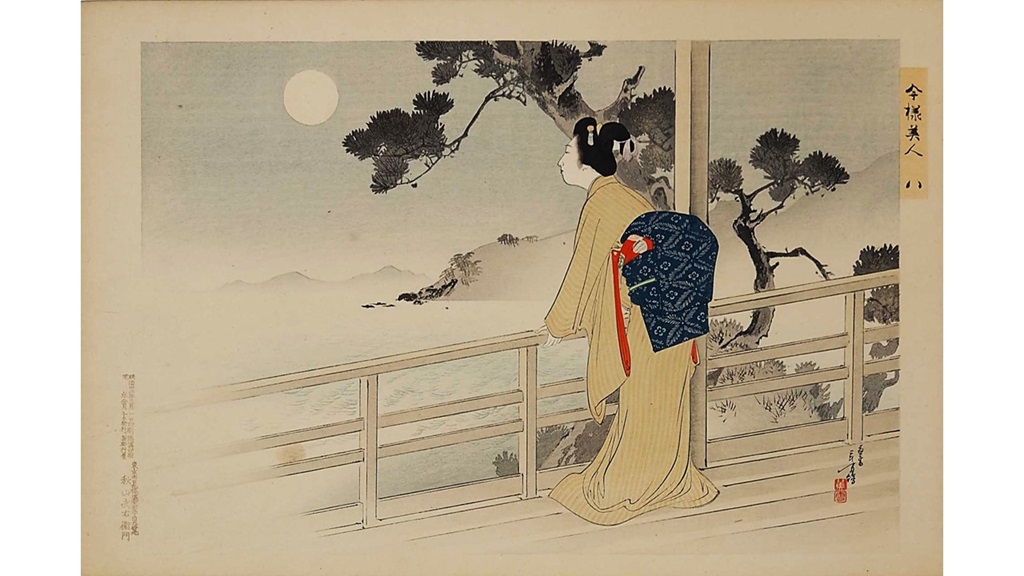.
The Tale of the Moon’s Reign
—an elegy
Above the skies where reigns the moon
_So bright in hours of gloom
Lived those whose hearts no longer feel
_Nor suffer and yearn to heal.
We mortals hailed this sacred realm,
_Where bliss must overwhelm.
Their princess once found herself lost
_In lands where tears mean most
As signs of care and feelings shared,
_Where heartfelt songs are aired.
She found kind hearts that gave the love
_Unknown in lands above.
But in return she showed no care;
_Their grief, she did not share.
Yet soon she healed within her soul,
_And tears began to fall.
She knew that here, she didn’t belong,
_But wept to hear our songs.
Though loved was she by village hearts
_And vowed to never depart,
The moon’s bright gaze did well remind
_To leave this world behind.
Her earthly mother wept, deplored
_To lose her most adored.
Her prince distraught at news she’d leave,
_Sent knights to her that eve.
She offered herbs that cast off death
_But he gave these words breath:
“For gone are now our days of bliss;
_It’s you, not life, I’ll miss.”
The chariots of heaven now descend—
_Armed knights would not offend.
Her first footsteps with teardrops fell;
_She heard her loved ones yell,
But soon the robe of heaven she wore,
_And felt nor knew no more.
The prince then climbed the highest peak
_To seek the moonlight bleak.
How much the lovestruck prince would plead,
_“Love’s smoke shall blow to thee.”
He wept as snowflakes started to fall.
_Her robes and letters, burnt all.
The legends tell of Mount Fuji,
Where love’s smoke rises for you to see.
_
Poet’s Note: The Tale of the Bamboo Cutter is an ancient Japanese tale. I have rendered it here in English verse on the night of moonlight pale. To be sung in the tune of Kojō no Tsuki “The Moon over the Ruined Castle.”
.
.
Yoshikaze Kawakami studied classical Japanese literature in Tokyo. He has published translations of Noh theatre in Poetry and Wordplay in Noh Theatre.















I was familiar with this beautiful tale from when I was a youth and love the great way you have unveiled this poetry and music. I could feel your inner being pouring itself out in this sensitive poem. Mount Fuji is so central to the Japanese culture and ethos as all Japanese seem to honor and pay homage to it.
Thank you, Roy. I am glad you appreciated it. Indeed, Mt. Fuji has been depicted and portrayed in various stories in Japanese literature. This one is perhaps one of the oldest of such tales.
A lovely rendering of this tale with princess and prince each as central in an important aspect. We usually think of healing as good and causing no further pain, but here the princess heals and is able to experience love again, with something of its sorrow, as the prince who loves her bemoans the loss of their bliss when she returns above. We understand when he says, “It’s you, not life, I’ll miss.” We wonder what effect “love’s smoke” can have on her when he burns her robe and letters. He weeps as he does so, and we also wonder what unhealed pain it causes him to make this final effort at communication. Your English, Yoshikaze-san, beautifully transfers the mystery of lost love to us of unhealed hearts beneath the moon and Mount Fuji. Well done!
Excellent work.
Mr. Kawakami, your response to my comment seems to have disappeared. I did see it, and I agree with you that the story has a metaphysical dimension. This makes the non-linear time sequence of the narrative an unusual and particularly intriguing one.
Thank you, Margaret, and Daniel.
Regarding your question about
“love’s smoke,” the Japanese word “omoi” (pining, mourning), shares the sound with “omo-hi”(flame). Perhaps
“The flame shall burn every morning(mourning)” is a closer rendition of the wordplay.
As for your mention about the princess “healing,” I find the time in this tale to be non-linear. The last stanza connects to the beginning again and the tale is recurrent.